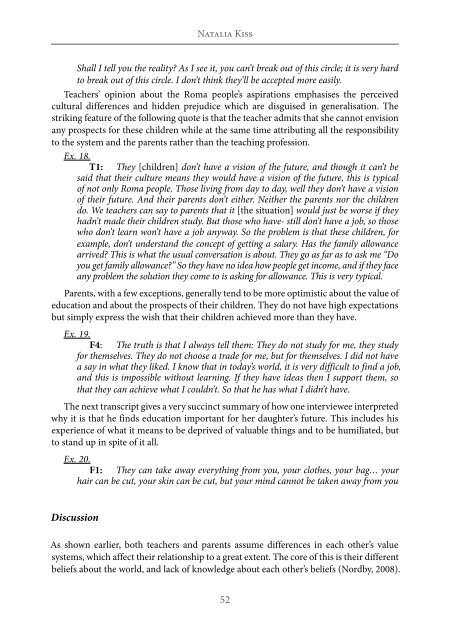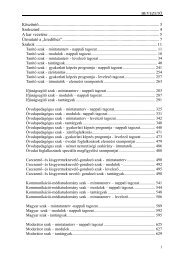ACTA SZEKSZARDIENSIUM - Pécsi Tudományegyetem Illyés Gyula ...
ACTA SZEKSZARDIENSIUM - Pécsi Tudományegyetem Illyés Gyula ...
ACTA SZEKSZARDIENSIUM - Pécsi Tudományegyetem Illyés Gyula ...
You also want an ePaper? Increase the reach of your titles
YUMPU automatically turns print PDFs into web optimized ePapers that Google loves.
Natalia Kiss<br />
Shall I tell you the reality? As I see it, you can’t break out of this circle; it is very hard<br />
to break out of this circle. I don’t think they’ll be accepted more easily.<br />
Teachers’ opinion about the Roma people’s aspirations emphasises the perceived<br />
cultural differences and hidden prejudice which are disguised in generalisation. The<br />
striking feature of the following quote is that the teacher admits that she cannot envision<br />
any prospects for these children while at the same time attributing all the responsibility<br />
to the system and the parents rather than the teaching profession.<br />
Ex. 18.<br />
T1: They [children] don’t have a vision of the future, and though it can’t be<br />
said that their culture means they would have a vision of the future, this is typical<br />
of not only roma people. Those living from day to day, well they don’t have a vision<br />
of their future. And their parents don’t either. Neither the parents nor the children<br />
do. We teachers can say to parents that it [the situation] would just be worse if they<br />
hadn’t made their children study. But those who have- still don’t have a job, so those<br />
who don’t learn won’t have a job anyway. So the problem is that these children, for<br />
example, don’t understand the concept of getting a salary. Has the family allowance<br />
arrived? This is what the usual conversation is about. They go as far as to ask me “Do<br />
you get family allowance?” So they have no idea how people get income, and if they face<br />
any problem the solution they come to is asking for allowance. This is very typical.<br />
Parents, with a few exceptions, generally tend to be more optimistic about the value of<br />
education and about the prospects of their children. They do not have high expectations<br />
but simply express the wish that their children achieved more than they have.<br />
Ex. 19.<br />
F4: The truth is that I always tell them: They do not study for me, they study<br />
for themselves. They do not choose a trade for me, but for themselves. I did not have<br />
a say in what they liked. I know that in today’s world, it is very difficult to find a job,<br />
and this is impossible without learning. If they have ideas then I support them, so<br />
that they can achieve what I couldn’t. So that he has what I didn’t have.<br />
The next transcript gives a very succinct summary of how one interviewee interpreted<br />
why it is that he finds education important for her daughter’s future. This includes his<br />
experience of what it means to be deprived of valuable things and to be humiliated, but<br />
to stand up in spite of it all.<br />
Ex. 20.<br />
F1: They can take away everything from you, your clothes, your bag… your<br />
hair can be cut, your skin can be cut, but your mind cannot be taken away from you<br />
Discussion<br />
As shown earlier, both teachers and parents assume differences in each other’s value<br />
systems, which affect their relationship to a great extent. The core of this is their different<br />
beliefs about the world, and lack of knowledge about each other’s beliefs (Nordby, 2008).<br />
52




